Related Research Articles
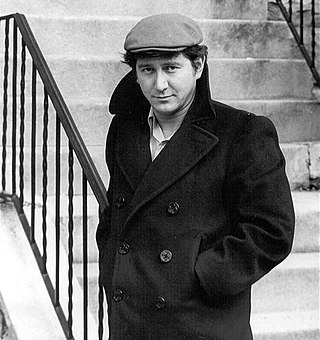
Philip David Ochs was an American songwriter and protest singer. Ochs was known for his sharp wit, sardonic humor, political activism, often alliterative lyrics, and distinctive voice. He wrote hundreds of songs in the mid 1960s to early 1970s and released eight albums.
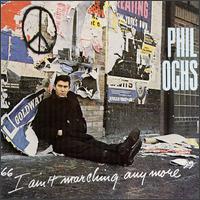
I Ain't Marching Any More is Phil Ochs' second LP, released on Elektra Records in 1965.
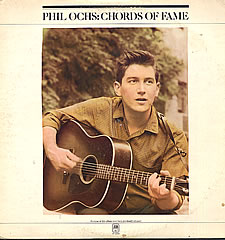
Chords Of Fame is a two-LP compilation from American folk singer Phil Ochs, compiled by his brother Michael Ochs shortly after Phil's death and released in 1976 on A&M Records. With the exception of 1969's Rehearsals for Retirement, all studio albums are represented, as well as a number of live releases.

Live at Newport is a 1996 compilation on Vanguard Records of folk singer Phil Ochs' three appearances at the Newport Folk Festival, in 1963, 1964 and 1966. Presenting twelve tracks that also appear on his first, second, third, fourth and fifth albums, Ochs is at his peak as a folk singer throughout, singing anti-war songs alongside those espousing civil rights and worker's rights, and showcasing some more introspective numbers that would be dramatically rearranged on the fourth and fifth albums.

The Early Years is a compilation of seven recordings Phil Ochs made for a Vanguard compilation in 1964 and twelve made at three Newport Folk Festivals in 1963, 1964, and 1966, the latter tracks previously released on the 1996 compilation Live at Newport.
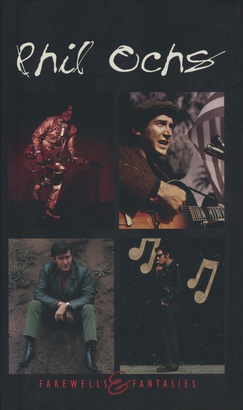
Farewells & Fantasies is the 1997 posthumous box set of the work of singer/songwriter Phil Ochs, chronicling his life and career in music from 1964 through 1970. With its non-chronological running order, it plays like three separate albums, each showcasing a different side of Ochs. The compilation was produced by Gary Stewart, Michael Ochs and Meegan Lee Ochs. Liner notes include a foreword by Meegan Lee Ochs, "The Sound of Freedom Callin'" by Michael Ventura and "Song of a Soldier: The Life and Times of Phil Ochs" by Mark Kemp, track-by-track explanations by Ben Edmonds, discography, selected bibliography, and many photographs, some of which are from the family's private collections. The box set is dedicated to a friend, co-writer, and inspiration to Phil Ochs, Bob Gibson, who died while the box set was in production. Its title comes from the back of Ochs' LP Tape from California.
"Power and the Glory" is an American patriotic song by Phil Ochs, a U.S. protest singer from the 1960s known for being a harsh critic of the American military and industrial establishment. Originally released on his 1964 debut album, All the News That's Fit to Sing, "Power and the Glory" is said to have contributed to Ochs' profound impact.
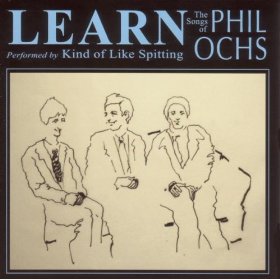
Learn: The Songs of Phil Ochs is a cover album by the band Kind of Like Spitting. The songs included were all written by the U.S. protest singer Phil Ochs. The CD booklet features Ben Barnett's studious commentary on the songs. It was released on September 6, 2005, on Hush Records.

"I-Feel-Like-I'm-Fixin'-to-Die Rag" is a song by the American psychedelic rock band Country Joe and the Fish, written by Country Joe McDonald, and first released as the opening track on the extended play Rag Baby Talking Issue No. 1, in October 1965. "I-Feel-Like-I'm-Fixin'-to-Die Rag"'s dark humor and satire made it one of the most recognized protest songs against the Vietnam War. Critics cite the composition as a classic of the counterculture era.
What's That I Hear?: The Songs of Phil Ochs is a 1998 tribute compilation to the music of the late Phil Ochs. The various performers cover several generations of Ochs' admirers. All profits from the album's sales were divided equally between the non-profits, the ACLU Foundation of Southern California and Sing Out! Magazine.

"I Ain't Marching Any More" is an anti-war song by Phil Ochs, a U.S. protest singer from the 1960s known for being a passionate critic of the American military industrial complex. Originally released on his 1965 album of the same name, "I Ain't Marching Any More" is one of Ochs's best-known songs.

"Bwatue" is a song by Phil Ochs, a US singer-songwriter best known for the protest songs he wrote in the 1960s. He co-wrote the song with two African musicians named Dijiba and Bukasa. "Bwatue" was written and recorded in 1973.
"The War Is Over" is an anti-war song by Phil Ochs, an American protest singer in the 1960s and early 1970s. Ochs was famous for harshly criticizing the Vietnam War and the American military-industrial establishment. The song, which was originally released on Tape from California (1968), has been described as "one of the most potent antiwar songs of the 1960s".
"There but for Fortune" is a song by American folk musician Phil Ochs. Ochs wrote the song in 1963 and recorded it twice, for New Folks Volume 2 and Phil Ochs in Concert. Joan Baez also recorded "There but for Fortune" in 1964, and her version of the song became a chart hit.

The discography of Phil Ochs, a U.S. protest singer and songwriter, consists of seven studio albums, six live albums, six compilation albums, one box set, six other albums, and nine singles.
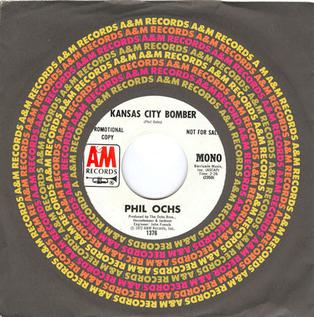
"Kansas City Bomber" is a song by Phil Ochs, a US singer-songwriter best known for the protest songs he wrote in the 1960s.

Phil Ochs: There but for Fortune is a documentary film on the life and times of folk singer-songwriter Phil Ochs. The film, released theatrically in January 2011, was written and directed by Kenneth Bowser. Its title is taken from one of Ochs' best known songs, "There but for Fortune" (1963).
"Love Me, I'm a Liberal" is a satirical song by Phil Ochs, an American singer-songwriter. Originally released on his 1966 live album, Phil Ochs in Concert, "Love Me, I'm a Liberal" was soon one of Ochs's most popular concert staples.

Draft evasion in the Vietnam War was a common practice in the United States and in Australia. Significant draft avoidance was taking place even before the United States became heavily involved in the Vietnam War. The large cohort of Baby Boomers allowed for a steep increase in the number of exemptions and deferments, especially for college and graduate students. More than half of the 27 million men eligible for the draft during the Vietnam War were deferred, exempted or disqualified.
References
- ↑ Perone, James E. (2004). Music of the Counterculture Era. Westport, Conn.: Greenwood Press. p. 40. ISBN 0-313-32689-4.
- 1 2 3 Dean, Maury (2003). Rock 'n' Roll Gold Rush: A Singles Un-Cyclopedia. New York: Algora Publishing. p. 78. ISBN 0-87586-207-1.
- 1 2 Foley, Michael S. (2003). Confronting the War Machine: Draft Resistance During the Vietnam War. Chapel Hill, N.C.: University of North Carolina Press. pp. 72–73. ISBN 0-8078-5436-0.
- ↑ Ochs, Phil (1964). Songs of Phil Ochs. New York: Appleseed Music. p. 11. OCLC 41480512.
- ↑ Perone, James E. (2001). Songs of the Vietnam Conflict. Westport, Conn.: Greenwood Press. p. 29. ISBN 0-313-31528-0.
- ↑ Perone (2001). Songs of the Vietnam Conflict. Bloomsbury Academic. p. 90. ISBN 9780313315282.
- ↑ Simmonds, Jeremy (2008) [2006]. The Encyclopedia of Dead Rock Stars: Heroin, Handguns, and Ham Sandwiches. Chicago: Chicago Review Press. p. 87. ISBN 978-1-55652-754-8.
- ↑ Ochs, Phil (1965). I Ain't Marching Anymore (Media notes). Elektra. EKL-287/EKS-7287.
- ↑ Cohen, David (1999). Phil Ochs: A Bio-Bibliography. Westport, Conn.: Greenwood Press. p. 232. ISBN 0-313-31029-7.
- ↑ Schumacher, Michael (1996). There But for Fortune: The Life of Phil Ochs . New York: Hyperion. p. 179. ISBN 0-7868-6084-7.
- ↑ Bodroghkozy, Aniko (2001). Groove Tube: Sixties Television and the Youth Rebellion . Durham, N.C.: Duke University Press. pp. 127–128. ISBN 0-8223-2645-0.
- ↑ Cohen, Phil Ochs, pp. 278, 285, 286.
- ↑ "Spotlight Singles". Billboard . July 9, 1966. p. 16.